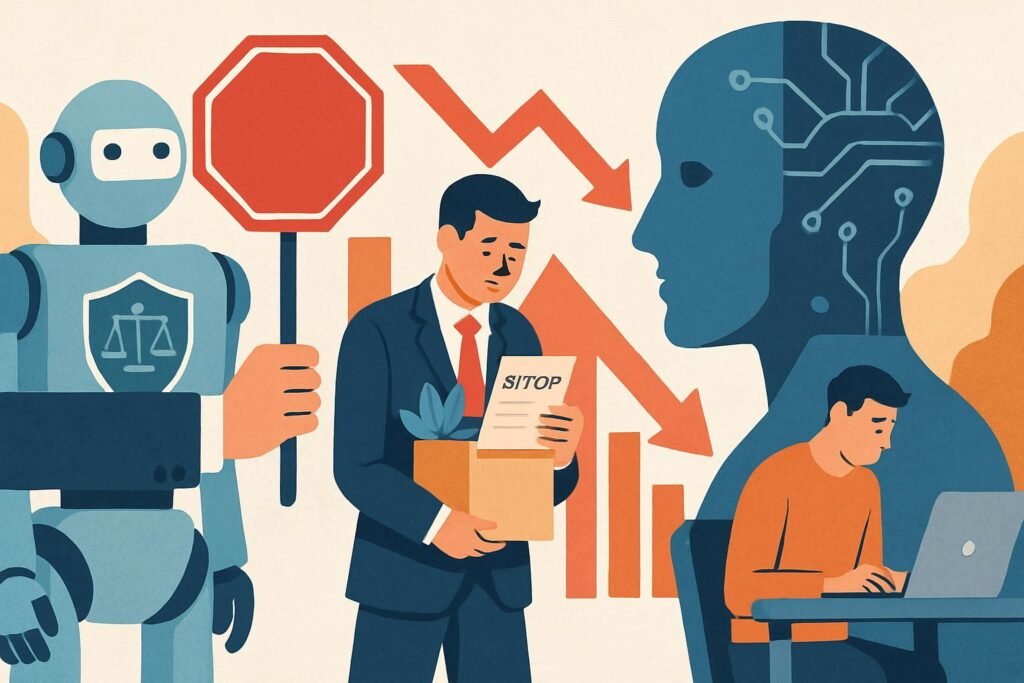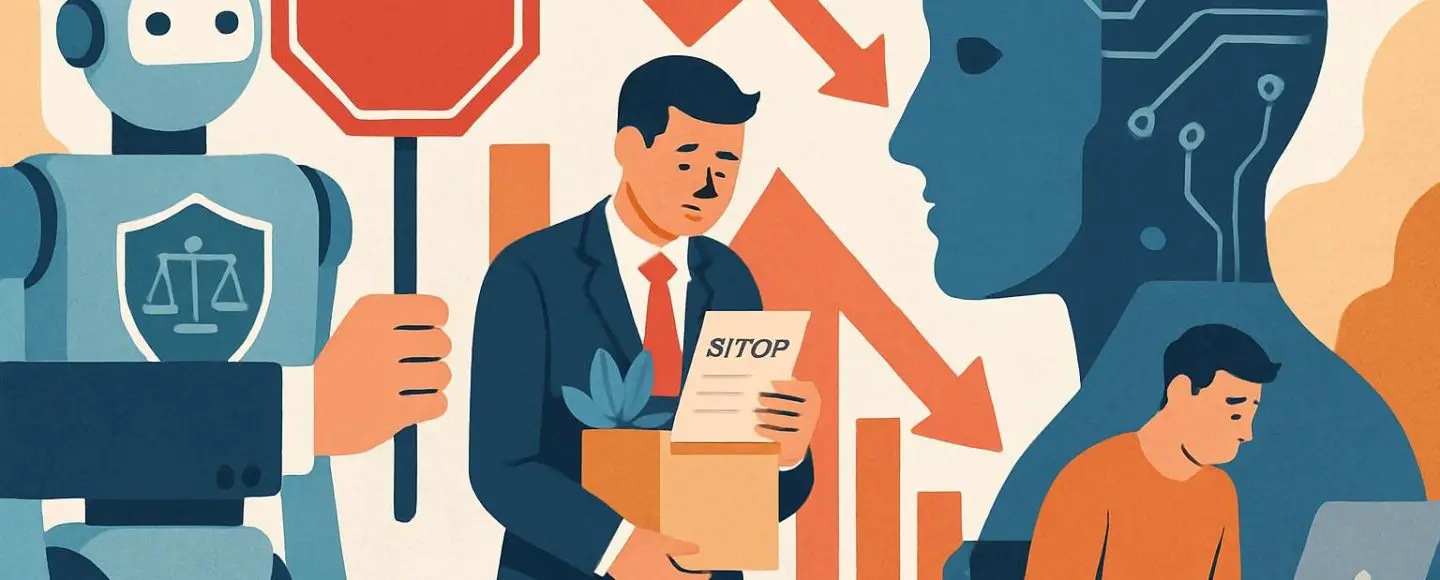

AI Disruption Spurs Regulation and Layoffs
AI disruption is no longer a futuristic notion. It is a present-day reality that is reshaping global industries. As artificial intelligence rapidly expands across enterprise operations, regulators are working to establish policies that promote transparency and uphold ethical standards. In parallel, businesses are leveraging AI for automation, leading to layoffs and cost restructuring. This shift requires CIOs and compliance leaders to find a balance between innovation, ethical responsibility, workforce sustainability, and cybersecurity readiness. Understanding the intersection of AI regulation and labor impact is now essential for strategic decision-making in both the public and private sectors.
Key Takeaways
- The surge in AI regulation is prompting companies to rethink compliance, cybersecurity, and digital transformation strategies.
- AI-driven layoffs are affecting roles across sectors, particularly in tech and operations, as automation becomes more prevalent.
- Global policy efforts like the EU AI Act and U.S. Executive Orders are creating a complex AI compliance landscape.
- CIOs and enterprise leaders are balancing AI’s potential with the impact on human capital and regulatory risk.
Global Acceleration of AI Regulation
Regulatory bodies across the globe are moving quickly to address the ethical, legal, and economic implications of AI. The European Union’s AI Act, finalized in 2023, is the most comprehensive framework to date. It categorizes AI systems by risk level and places strict obligations on developers and users of high-risk tools, including biometric surveillance and automated decision-making in employment.
In the United States, President Biden’s Executive Order from October 2023 focuses on AI safety, national security, and consumer protections. It establishes safety standards and requires federal agencies to procure AI systems responsibly. This initiative, along with the White House’s AI regulation rules, signals a shift from voluntary guidelines to enforceable oversight.
Other regions are also taking action. Singapore has proposed its Model AI Governance Framework, while nations such as Brazil and South Africa are starting to develop formal AI policies that address algorithmic bias, data privacy, and transparency requirements. These global movements are shaping a regulatory environment that all international companies must navigate.
AI-Driven Layoffs and the Future of Work
As businesses integrate AI to increase efficiency, labor markets are seeing rising displacement across a range of administrative and operational roles. IBM and British Telecom have both announced substantial workforce reductions linked to AI-driven automation. For instance, IBM’s CEO noted in 2023 that about 30% of non-customer-facing roles could be replaced by AI. BT forecasted a 55,000 position reduction by 2030, with nearly 10,000 roles directly impacted by automation technologies.
A 2023 McKinsey report estimated that between 400 to 800 million jobs may face disruption by 2030. Roles involving repetitive tasks, such as customer service or data entry, are at the highest risk. In contrast, professions that require creativity, strategic thinking, or interpersonal skills may be enhanced by AI tools, rather than replaced. Companies like Klarna are also undergoing shifts, such as when the Klarna CEO replaced workers with AI in key departments, highlighting how quickly staff transformations can occur.
To stay informed on evolving labor trends, explore how AI affects the future of work across various industries.
Enterprise Automation: Boon or Burden?
Automation offers companies the potential to streamline processes and increase scalability. Yet it introduces complexities that go beyond technology. CIOs and transformation officers must evaluate automation not only through the lens of cost reduction but also in terms of long-term workforce and compliance outcomes. For some companies, cost pressures have led to rapid adoption of automation. For others, the push for quick deployment has resulted in regulatory issues and employee dissatisfaction.
Many enterprises are responding with layered automation strategies. These approaches include retraining employees, deploying AI ethics boards, and conducting risk assessments for each implementation. According to Gartner’s 2024 CIO Agenda, 61% of organizations now view AI as a “double-edged strategic lever,” offering both opportunity and risk.
Insights from recent trends in AI governance and regulation show that strategic planning and responsible deployment are crucial components of successful AI integration.
Compliance in an Age of Autonomous Systems
Compliance is now a company-wide responsibility. With AI touching every operational layer, it is no longer sufficient to treat compliance as a legal formalism. The EU AI Act mandates transparency, reporting obligations, and human oversight mechanisms for high-risk AI functions. Companies must build compliance into procurement, product development, and cybersecurity operations.
U.S.-based firms managing both domestic and international business units are creating flexible compliance frameworks that adapt to changing rules. AI risk assessment is being embedded within the development life cycle in the same way that cybersecurity best practices are used in secure coding. Protection against prompt injection, model poisoning, and unauthorized data exposure is now essential to enterprise defense strategies.
Case Studies: How Enterprises Are Responding
IBM: IBM continues to invest in AI orchestration platforms that include oversight mechanisms. Its internal AI Ethics Committee collaborates with legal and HR teams to align development practices with global regulatory expectations. While pioneering AI adoption, the company is also taking steps to balance innovation against workforce impact.
British Telecom (BT): BT is transitioning many customer service functions to AI-powered platforms. It uses generative AI tools for self-diagnostics and natural language support. To reduce the negative effects on employees, BT has committed to retraining programs and established partnerships with universities to help workers adapt.
Accenture: Accenture has introduced a policy framework for managing generative AI, with emphasis on risk mitigation, workforce preparedness, and regulatory compliance. Its decentralized AI governance model includes real-time assessments and ethical scoring. This structure enables quick adaptation to shifting legal environments while promoting accountability.
The Broader Implications: Cybersecurity, Privacy, and Auditability
Introducing AI systems into enterprise environments increases exposure to risks that extend beyond job displacement. Attacks on AI models can compromise sensitive data or generate unreliable outcomes. Model transparency and auditability are now required in many regions. The EU AI Act specifies disclosure obligations, such as source data documentation and logs of human intervention points.
Organizations operating in healthcare, finance, or insurance must also meet strict data privacy standards like GDPR or HIPAA. Poor documentation and lack of explainability can result in legal penalties. Legal experts recommend that companies maintain “AI audit logs” similar to financial trails, recording model decisions and interactions throughout their lifespan.
For industries reliant on digital advertising, such as media or retail, AI’s influence is also spreading. Technologies that drive automated advertisements are under scrutiny, as discussed in recent evaluations of how AI disrupts search and advertising.
Expert Insight: What Enterprise Leaders Are Saying
Deborah Raymond, VP of Legal and Compliance at a global fintech company, shared the following insight: “We’ve moved from AI experimentation to AI accountability. Regulators expect proactive governance, which means investing in transparency, fairness testing, and stakeholder engagement.”
Mark Velasquez, CIO at a Fortune 500 logistics firm, added: “We expected AI to save costs, but found it reshaped how we define risk. AI introduces as many liabilities as efficiencies. That’s changed our enterprise architecture significantly.”
These viewpoints highlight the evolving role of senior technology and legal leaders. Managing AI is no longer about tools. It is an ongoing process that demands collaboration and vigilance throughout the AI life cycle.
Frequently Asked Questions
What is the EU AI Act and how does it work?
The EU AI Act is a regulatory framework that organizes AI systems by their risk level to users and society. High-risk systems need transparency protocols, human supervision, and regular assessments. The regulation aims to ensure ethical use of AI in critical sectors such as healthcare, education, employment, and law enforcement.
Is AI causing job losses in tech?
Yes. Job displacement within the tech industry is increasing due to AI, especially for roles that involve routine tasks such as support, testing, or moderation. Companies like IBM and BT have pointed to AI as a reason for workforce reductions. New opportunities are emerging, but many workers must be retrained for evolving roles.
How are governments regulating AI?
Governments are putting in place laws focusing on accountability, fairness, and transparency in AI use. The EU AI Act and U.S. Executive Orders are prominent examples, along with national frameworks in Canada, Brazil, and Singapore. Regulations often require risk assessments, documentation, audits, and clear accountability mechanisms.





